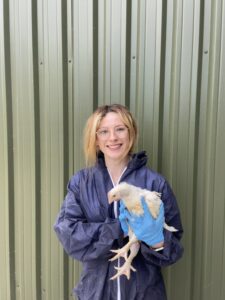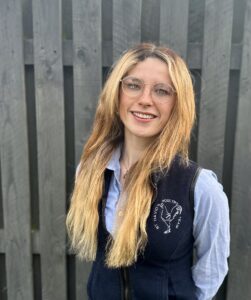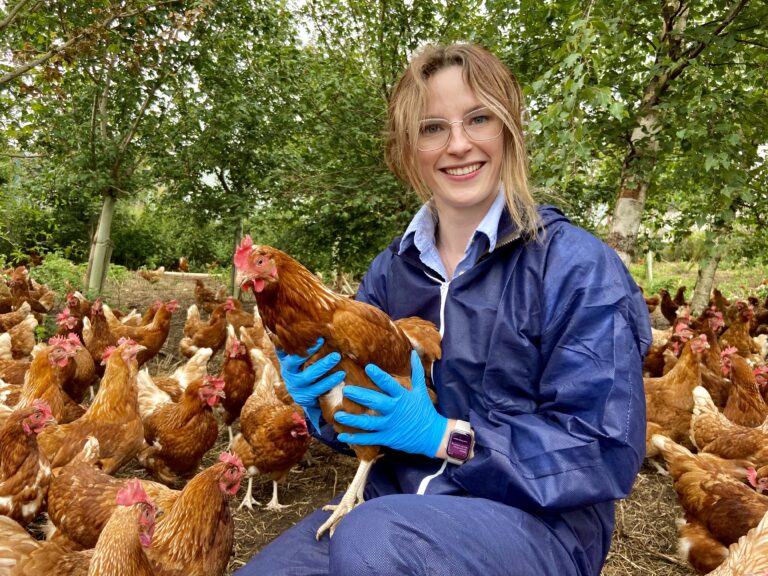The 2024 Young Farm Vet of the Year has already crammed a huge amount into her short career, and as Michael Barker finds out , she is only just getting started
Esme Chapman jokes she has warned her employers that if Jurassic Park is ever created for real, she’ll be off like a shot.
The 26-year-old winner of the Young Farm Vet of the Year at the 2024 National Egg & Poultry Awards grew up imagining a career as a palaeontologist, before settling on working with their close modern descendent, the chicken.
She might be a big dreamer with limitless ambitions, but anyone who doubts her determination to achieve them need only look at her rollcall of success at such a tender age. Now a poultry veterinary surgeon at St David’s Poultry Team, Chapman has already become the youngest vet to achieve a CertAVP in poultry, has published a scientific paper and is working on two more, and is already lecturing to the next generation of students. She’s packed more into three years than many people manage in several decades.

Growing up in the Birmingham suburbs, the farming sector was not an obvious career choice for Chapman, but she quickly became fascinated by the possibilities and threw herself into learning through experience. “I wanted to be a dinosaur vet when I was a kid,” she laughs. “I was torn between veterinary and palaeontology when I was very young, and I went down the living animal route rather than the long-deceased animal route! Obviously chickens are dinosaurs – I love their behaviour, watching them and seeing how their brains work. And I like all the epidemiology, disease and pathology, and being able to open them up and see what’s going on.”
As a young teenager Chapman worked at the Domestic Fowl Trust, an organisation that sells poultry and equipment to the backyard market. That exposed her to the world of breeding and incubation, and she recalls candling hundreds of eggs by hand as she began to learn her trade. Indeed, she enjoyed it so much that she says that, were it not for the biosecurity element being incompatible with her work, she would still do it in her spare time.
Chapman tells a familiar tale of most veterinary students at university wanting to focus on one of the ‘big three’ – small animals (pets), equine or farm – and that there was little awareness of poultry specifically as a career option. By contrast, she is keen to point out the wide range of fascinating roles within the sector, from working at the APHA, to pathology, to the export sector. “There are so many avenues that aren’t the traditional vet, that people don’t realise,” she points out. As well as her CertAVP, she has also completed her (post-graduate) PGCert and will be taking the poultry-specific exam in December.
After graduating from the University of Liverpool, Chapman began her professional career at Howells Veterinary Services, before joining St David’s in September 2023. Today, her job involves everything from routine farm visits to look at gut scarring or perform breeding assessments, to disease investigations and post-mortems. One area she is particularly passionate about is statistical analysis, and studying client data to see where performance can be optimised or to identify trends and issues. She credits this passion for numbers and statistics to her father, who teaches business, maths and IT.
Marginal gains
One often hears sportspeople talk about marginal gains and how this gives them an edge, and that’s very much Chapman’s philosophy too as she looks to work with farmers to make them as efficient as possible. “I think it [data analysis] is only going to get bigger and more important, especially with the fine margins that we deal with now,” she explains. “It’s a lot more of a science now to be a chicken farmer, and it’s about looking for those minute changes or really small dips in graphs or shed performance when you break down a farm. The whole farm might be okay, and it might be performing averagely. But within one farm, you can have one shed that’s performing really, really well, and one that’s not performing so well, and the data helps trying to pinpoint where things are happening and where to look.”

Chapman admits she gets a buzz from helping farmers achieve a good performance with their flock, and loves the collaboration that comes with working with them to overcome problems and achieve the best possible outcomes. And there are certainly plenty of challenges: starting a career as a poultry vet at the height of the avian flu crisis isn’t for the fainthearted, and that’s just the start of the plethora of issues that farmers have to overcome to succeed.
In farming overall, it is often observed how climate change is affecting production, but while that issue is constantly cited in horticulture, Chapman believes it is also a major issue for poultry and will have a material effect on the infrastructure that producers install in the years ahead. “As we get hotter and hotter weather, heat stress and ventilating sheds is going to be an interesting development,” she says. “I’ve had a lot of people that have put misting systems in when they’ve never really previously needed them. Heat stress is going to become more of a problem, as our sheds aren’t really built for 35-40 degree temperatures.” That’s not the only hurdle presented by global warming either, as Chapman notes that as Britain becomes hotter and drier, diseases that come up from the tropics will become more prevalent, having not been a major issue in the past.
Given all that, Chapman is sympathetic to the task facing modern producers. She describes farming as “probably the hardest job in the UK” and sees her role as not just a scientist making cold analysis, but in working together with farmers to build a strategy. “It’s a ‘we’, never an ‘I’,” she says of the relationship. “How do we – a vet and a farmer – solve an issue together?”
Scientific rigour
Part of that is undoubtedly to do with the quality of knowledge available. Research and accurate science is key to giving birds the best possible lives, and it’s an area where Chapman believes more work needs to be done. She’s willing to play her part in that process too – she’s already had a paper published in the journal UK-VET Livestock, on the subject of adenoviral associated gizzard erosions, and is currently writing two more. She has a particular interest in researching pullet rearing, as well as the broiler sector generally.
It’s all ties into an overarching desire to play her part, to be a full contributor to the current and future poultry industry. Despite being so young, Chapman is already thinking about the next generation of vets, and has secured a guest lecturer spot to teach poultry next year, though she isn’t revealing where just yet. “I’m very passionate about younger people and getting the next generation involved,” she says. “I’ve already done some after-school talks, and I also went back to Liverpool and did a talk on avian influenza for the Farm Animal Veterinary Society, because AI is obviously a very important disease and they need to be able to recognise it. As a new grad going out, it’s a bit scary. I did it just as AI was really kicking off and had a bit of a baptism of fire, so it’s just preparing the new grads that they know what to do if they do see it, or if they’re on a beef farm, for example, and somebody asks them to look at their chickens.”
It’s not just about altruism, but Chapman sees the value of giving back. She lavishes praise on her St David’s colleague Charlotte Cole (née Norman), who herself won the Young Farm Vet of the Year Award and has acted as something of a mentor to her younger teammate. Cole was actually two years above Chapman at Liverpool and was helpful in providing advice both at that time, and since. “She just a brilliant vet, she’s incredible and great to learn things from,” she says. “St David’s are all fantastic, there are so many skilled vets there and I’m so grateful to the team as a whole.”
One of the youngest poultry vets in the business, lecturing, publishing scientific papers – that would be enough to keep most people busy for years, but Chapman has no intention of easing up. “I just think about what I’ve achieved in three years, so what can I do in the next three, 10, 50 years of my career?” she reflects. “I’ve got so far left to go. I think it’s a world of possibilities and optimism. I’m thinking, I could do anything – what should I focus on next?”
A keen runner who does half marathons on weekends, Chapman’s career is similarly not standing still. Jurassic Park may not materialise any time soon, but whatever else she puts her mind to, one would bet good money on her making a success of it.


